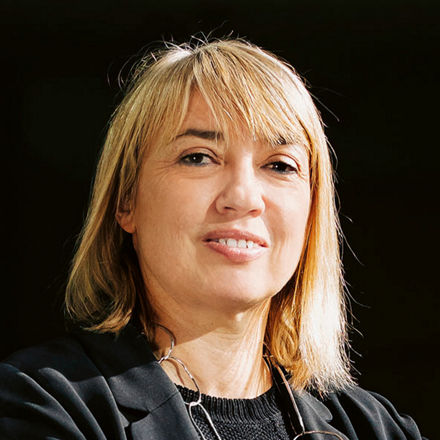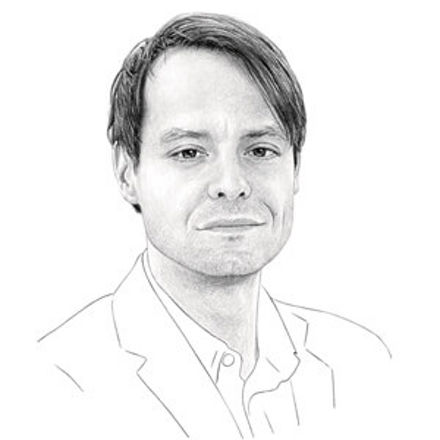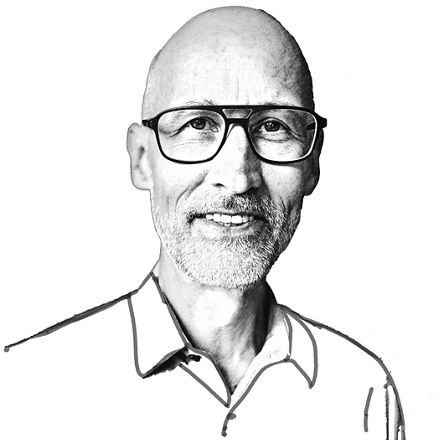“Research,” “Innovation,” “Foresight”—colorful giant letters on the glass facade of this futuristic building indicate its purpose. The Joint Research Centre of the European Commission in Brussels is the home of the EU Policy Lab, where Fabiana Scapolo and her colleagues develop visions of the future of the European Union. For this interview, Scapolo received us in a conference room equipped with flipcharts, pin boards, and high tables on which stand bowls full of Lego figures. “We often use these Lego figures in discussions to represent various interest groups,” she explained. However, during her hour-long conversation with the Evonik reporters, there was no time to use any of the plastic cowboys, nurses or firefighters.
In a few days the European Parliament will have its inaugural plenary session and elect the next Commission President. Do you think Europe is heading towards a positive future?
FABIANA SCAPOLO This is more a question for someone who has a crystal ball. In Foresight we don’t predict the future. There are a number of very important challenges that the EU is facing at the moment. Europe has to get closer to its citizens and to try to reduce the distance people feel towards its institutions. For me, this is the basis for the success of the next European Commission and the next European Parliament.
That sounds understandable. But how can you manage to get closer to citizens?
The Commission doesn’t have the mandate to legislate on all domains. There are certain areas where legislation and the implementation of European law are left to the member states. What has to be done is to communicate the positive stories of European institutions in a more effective way and to reduce distance to citizens. The Commission is taking some initiative in this respect and I think we are moving forward in this direction.
Obviously, we’re living in an era of rapid change. How does this affect your work of looking into the far future?
It has certainly become more difficult to develop plausible scenarios for the next 20 years. But if we don’t engage and try to understand what the future may unfold we will have even fewer possibilities to contribute to shaping what the future could be and to act on it. We need to push our policymakers to take the longer-term perspective more into account in the development of policies. Otherwise, we will be losing opportunities.

Do policymakers listen to you more carefully today than a few years ago?
Yes. They understand that it is necessary to develop what is called an anticipatory culture. For example, artificial intelligence (AI) might lead to a drastic loss of jobs. If you look at it closely it’s true that a number of routine tasks will be taken over by automation but, on the other hand, we can identify many opportunities that will open up thanks to AI: It could facilitate and speed up processes and boost productivity, thereby contributing to positive growth. It is still an area full of uncertainties. However, looking into the future allows us to explore possibilities and analyze what can be fears and threats but also to identify what can be our opportunities and hopes.
We always thought that politicians tended to be short-sighted, as they think in terms…
…and we are aware of that. During their mandate politicians, indeed, try to focus on solving current problems. However, we have to be conscious that some of the challenges and problems we experience today are megatrends that will continue in the future. If a policy takes into consideration what implications these megatrends have on policy issues today, we will have more sound policies. Politicians are beginning to understand that.
Which challenges in the EU should policymakers focus on in particular?
First of all, the change of our environment and how we deal with all the threats that come along with the rise of the CO₂ level, pollution, environmental degradation, and our excessive use of resources. It’s so important because it has very strong economic and social implications. However, here lies a chance for politics if citizens realize that there is awareness and action is being taken on global warming and the maintenance of the environment. And of course there are big economic challenges that are related to globalization and to what Europe’s role is in the worldwide picture.

»We should really fight against fake news and misinformation«
Fabiana Scapolo Deputy Head of Foresight, Modelling, Behavioural Insights and Design for Policy at the Joint Research Centre (JCR) of the European Commission in Brussels

»It has become more difficult to develop plausible scenarios for the next 20 years«
Do you think that looking back from 2040 Brexit will be seen as a “game changer” in the history of the European Union?
It isn’t yet clear how Brexit is going to evolve within the next two years. It doesn’t matter if there is a deal or not—this won’t be the end of the story, it will just be the beginning. Over the last couple of years we’ve been experiencing a rise in nationalism and populism. Potentially, there may be a lot of political instability and we don’t really know how it will evolve. This is something we should be looking at carefully in our foresight activities.
Within the EU, regions like Catalonia are striving for independence. What will be the consequences for the European Union if they succeed?
If this type of scenario materialized, Europe would have to adapt and give more power to the regions. This doesn’t necessarily have to be seen as a negative trend. Recently, we finalized a study about the future of government that touches upon this issue: In one of the scenarios that is called “super-collaborative government” we foresee a new institution at the European level that is called “European Convention of Mayors.” After all, it’s at the local level where you can interact most closely with the citizens and where you can co-design policy measures that take into consideration people’s needs. It’s possible that we will see a political shift towards regional types of institutions, but we have to ensure that we keep a level of governance that helps to bring regions together and tackle transregional and transnational issues.
According to recent opinion polls, migration is the topic of most concern for many Europeans. What should be the political answer to the steady inflow of people?
Probably this migration flow is not going to diminish. This, of course, has consequences for how the EU will look in 20 years. The question is: How do we ensure that enough effort is put into integration? These people help us in terms of demography, as the European population is getting older. Some immigrants are skilled people that could fill gaps in our economy. On the other hand, we also have to be attentive to the preservation of European cultural values. It is a matter of finding the right balance.
Many young people are particularly afraid of climate change. Will their “Fridays for Future” strikes evolve into a megatrend?
We don’t know yet. But this movement is positive. In a way the young generation is ringing a bell, they are telling us: “Hey, this is something we ask you to take care of because it’s about our future!” With our “horizon scanning” we try to detect such phenomena that are not yet on the policy radar but that can become very important issues in the future. And it’s our duty to bring this to the attention of our leaders.

The EU Policy Lab
The Joint Research Centre of the European Commission, which is located on the outskirts of the European Quarter in Brussels, has been the home of the EU Policy Lab since 2016. Here 24 scientists develop methods and processes for making European policy-making more effective and more successful. They cooperate with a number of policy labs in the member states of the EU. In addition to developing scenarios, the experts use approaches from the fields of behavioral science, simulation, and design thinking. Their goal is to promote more intensive interaction between political decision-makers and citizens.
As a scientist you work with facts. What happens if more and more people get into politics who don’t really care about facts and make up their own truth?
Our mandate is to bring evidence into policymaking. This is why we should really fight against fake news and misinformation. I’m optimistic that we will succeed. Just look at the big social media corporations that have started to take steps in acting against fake news. In Italy, for example, Facebook recently closed down accounts that were related to spreading fake news.
How can countries improve their fitness for the future? Do you see any role models in Europe?
Estonia is good example in the field of digitalization. But there are also projects on societal innovation in France, Sweden, and Spain. In a couple of countries policy labs have been established with the objective to co-design and co-develop policy together with citizens. This could be a good direction to go. By the way, digitalization is offering an opportunity to listen more carefully to people’s concerns.
Still, Europe is in danger of losing its role as a global innovation power and falling behind countries like the United States or China. Are we Europeans too risk-averse toward innovation?
I don’t think so. Maybe we are more cautious compared to other regions of the world. But having discussions about long-term implications can be positive even if in the short term you may lose competitiveness. What’s more important: We should focus on our education system. We should learn from other countries and give young people opportunities in order to retain the knowledge that we develop. There are a lot of people who study in Europe and then they go either to China or the US—those are missed opportunities.
What are your personal plans for the year 2040?
(laughing) I would like to live in the south of Europe, as I need sun. I hope that in 20 years’ time I still can be active at the community level—together with young people.



